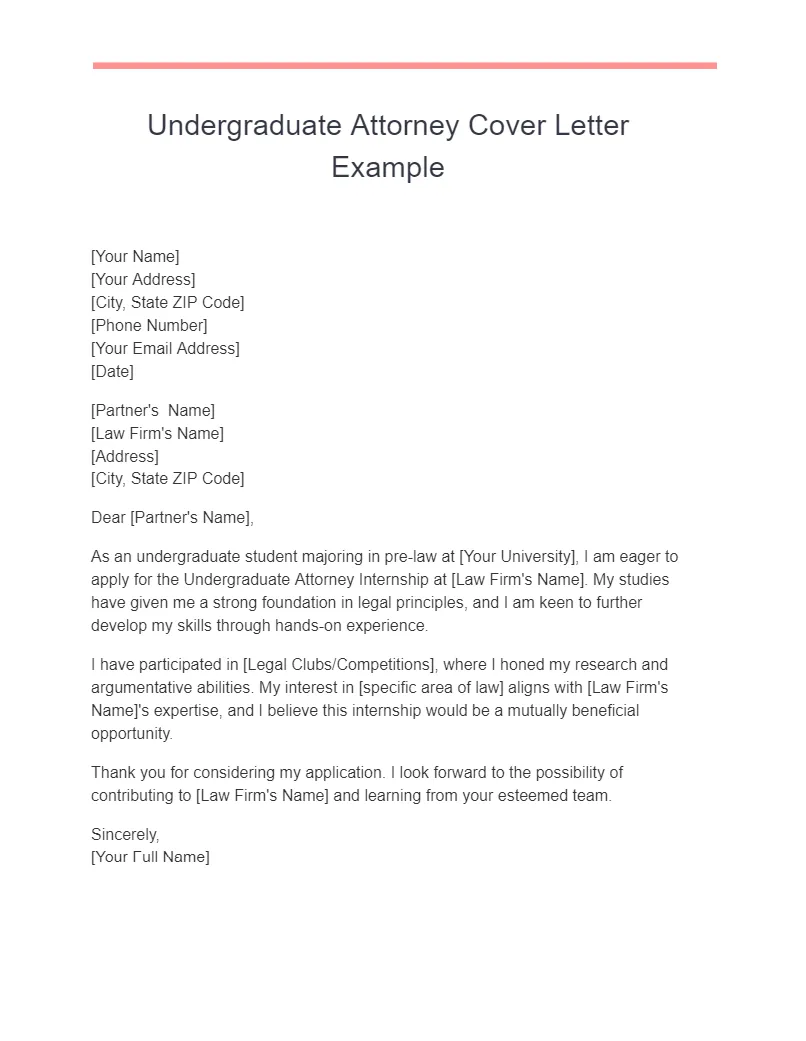The Power of a Lawyer Cover Letter
In the competitive world of law, a well-crafted cover letter can be the key that unlocks your dream job. Many lawyers underestimate the power of this document, viewing it merely as a formality. However, a compelling cover letter serves as your initial introduction, providing a platform to showcase your skills, experience, and personality beyond what is presented in your resume. It’s your first opportunity to make a strong impression on a potential employer and set yourself apart from other candidates. This document is an essential tool, often the deciding factor in securing an interview, and ultimately, a job offer. It’s your chance to demonstrate your understanding of the specific role and the firm’s needs, making you a more appealing candidate.
Why a Cover Letter Matters
A cover letter is much more than a simple formality. It is a vital opportunity to provide context to your resume, explaining why you are the perfect fit for a specific position. It allows you to address any potential gaps in your employment history, highlight specific accomplishments, and demonstrate your genuine interest in the role and the firm. A well-written cover letter showcases your communication skills, attention to detail, and your ability to articulate your career goals. Moreover, it gives you the space to explain how your skills and experiences align with the specific requirements of the job description and the firm’s values.
Highlighting Your Skills and Experience
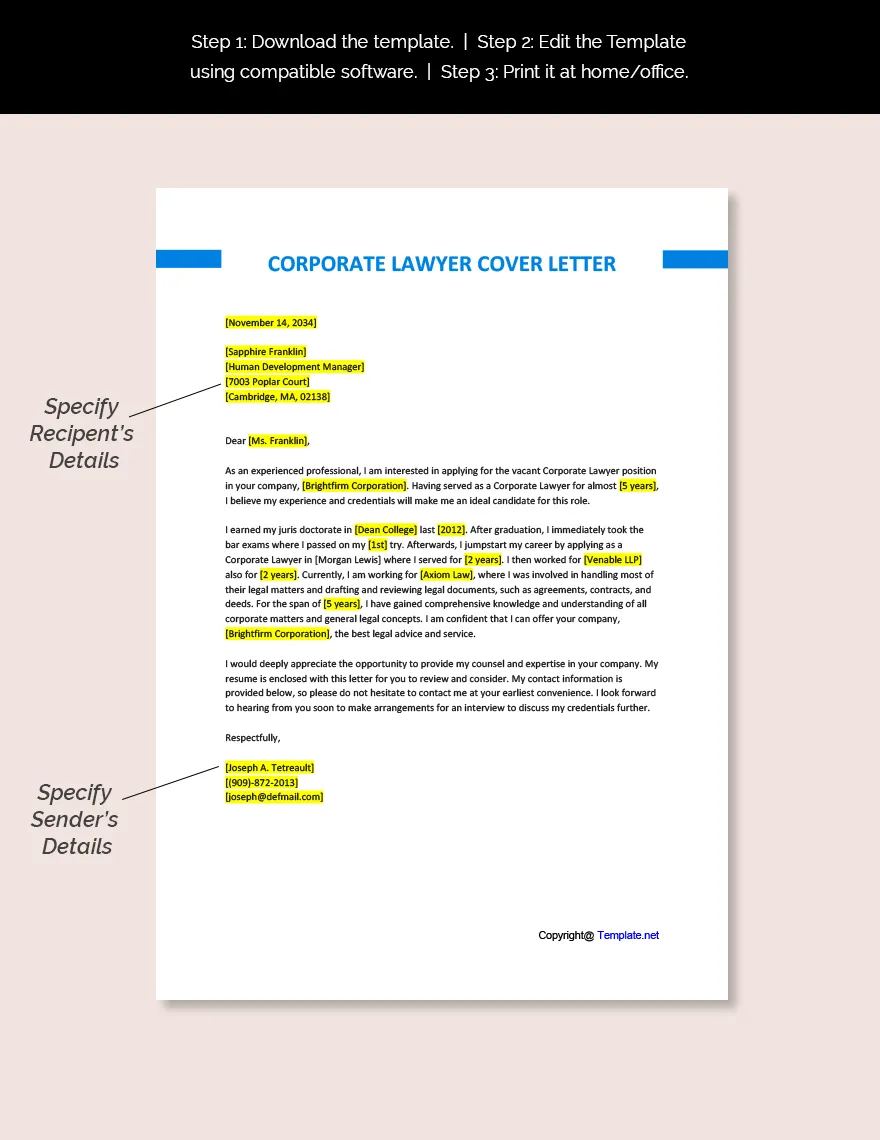
Your cover letter is the perfect place to highlight the skills and experience that make you an outstanding lawyer. Focus on showcasing the experiences and achievements most relevant to the position. Quantify your accomplishments whenever possible, providing concrete examples of your successes. For example, instead of simply stating that you ‘managed cases’, you could write ‘Successfully managed a caseload of 50+ clients, resulting in a 90% success rate’. This demonstrates your capabilities and the impact of your work. Adapt the letter to emphasize the skills most valued by the employer, such as legal research, negotiation, or courtroom advocacy. Use action verbs to showcase your abilities and tailor your language to resonate with the employer’s requirements. Always highlight the unique value you bring to the table.
Key Components of a Lawyer Cover Letter
Header and Contact Information
Your cover letter should begin with a professional header containing your contact information. Include your full name, phone number, email address, and LinkedIn profile URL (if applicable). Ensure your contact information is accurate and up-to-date, as this is how the hiring manager will reach you. It is crucial to ensure the letter’s formatting is professional and consistent with the rest of the document. The header should be clearly formatted and easily readable, as it sets the first impression for your application. Use a professional font and a standard font size.
Addressing the Hiring Manager
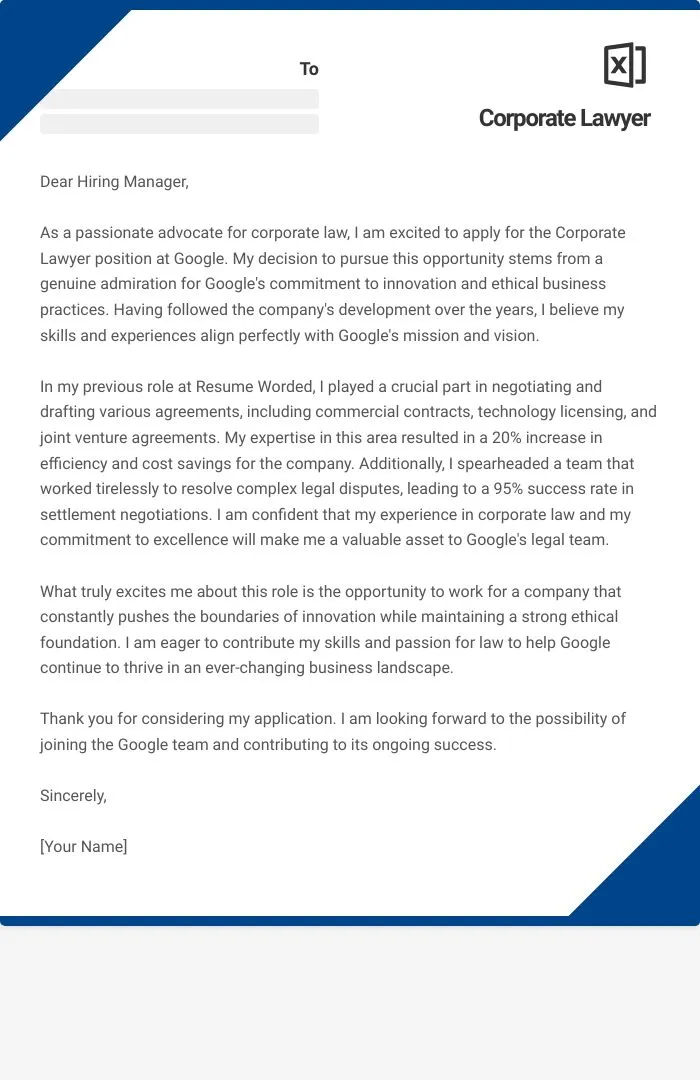
Always address your cover letter to a specific person, whenever possible. Research the hiring manager’s name and title. Addressing the letter to a specific individual shows initiative and demonstrates that you have taken the time to learn about the firm and the role. Avoid generic greetings like ‘To Whom It May Concern’ or ‘Dear Sir/Madam’. If you cannot find the hiring manager’s name, use a general greeting like ‘Dear Hiring Committee’ or ‘Dear [Law Firm Name] Hiring Team’. Personalizing the greeting makes your letter more engaging and shows you’ve put in the extra effort to apply for the role.
Opening Paragraph Strategy
The opening paragraph is crucial for grabbing the reader’s attention. Begin by stating the position you are applying for and where you found the job posting. Briefly mention why you are interested in the role and the firm. Clearly communicate your value proposition to the employer and briefly highlight one or two key skills or experiences that make you a strong candidate. Avoid generic opening statements; instead, create a compelling hook that immediately captures the hiring manager’s attention and piques their interest in learning more about you. Show enthusiasm and a genuine interest in the opportunity.
Body Paragraphs Unveiled
The body of your cover letter should elaborate on your skills, experience, and accomplishments. Structure your paragraphs logically, using clear and concise language. Each paragraph should focus on a specific point, providing examples to support your claims. Tailor your letter to the specific requirements of the job description, highlighting the most relevant aspects of your background. Use the STAR method (Situation, Task, Action, Result) to illustrate your achievements effectively. Show, don’t just tell, the employer why you are the best fit for the position by providing concrete examples of your successes and the impact you have made in previous roles. Focus on providing value to the company.
Showcasing Achievements and Accomplishments
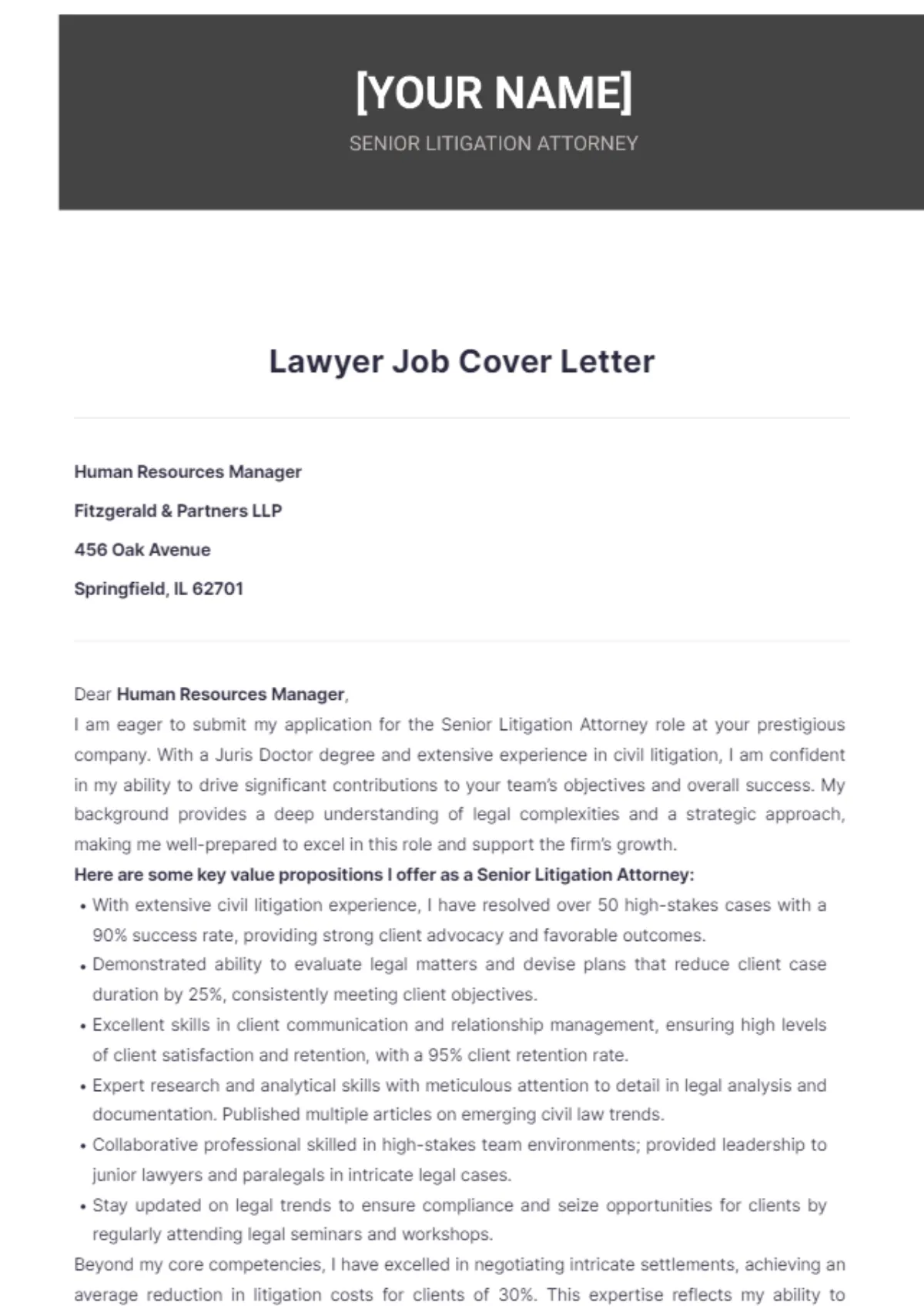
When highlighting your achievements, use quantifiable results whenever possible. Instead of saying ‘Successfully managed cases,’ state ‘Managed a caseload of 50+ clients, resulting in a 90% success rate.’ This provides concrete evidence of your capabilities. Use action verbs to describe your contributions, such as ’negotiated,’ ‘drafted,’ ’litigated,’ or ‘resolved.’ Tailor your examples to the specific requirements of the job description. Show how your previous experiences align with the firm’s needs and demonstrate the value you can bring to their team. Focus on results and outcomes to provide the employer with a clear understanding of your impact.
Tailoring Your Cover Letter
Customizing your cover letter for each job application is crucial. Generic cover letters are easily identifiable and often discarded. Tailor your letter to the specific requirements of the job description and the firm’s culture. Research the firm and understand its values, mission, and recent cases. Highlight how your skills and experience align with their specific needs. Customize your opening and closing paragraphs to show your genuine interest in the role and the firm. The more personalized your cover letter, the more likely you are to stand out from the competition. Take the time to research the firm and understand their specific needs and values to ensure your application stands out.
Closing Paragraph & Call to Action
In your closing paragraph, reiterate your interest in the position and the firm. Thank the hiring manager for their time and consideration. Include a clear call to action, such as ‘I am eager to discuss my qualifications further in an interview’ or ‘I look forward to hearing from you soon.’ Reiterate your enthusiasm for the opportunity and make it easy for the hiring manager to take the next step. Proofread the entire letter one last time before submitting your application. Ensure all contact information is correct and you express your sincere interest in the role.
Formatting & Proofreading Essentials
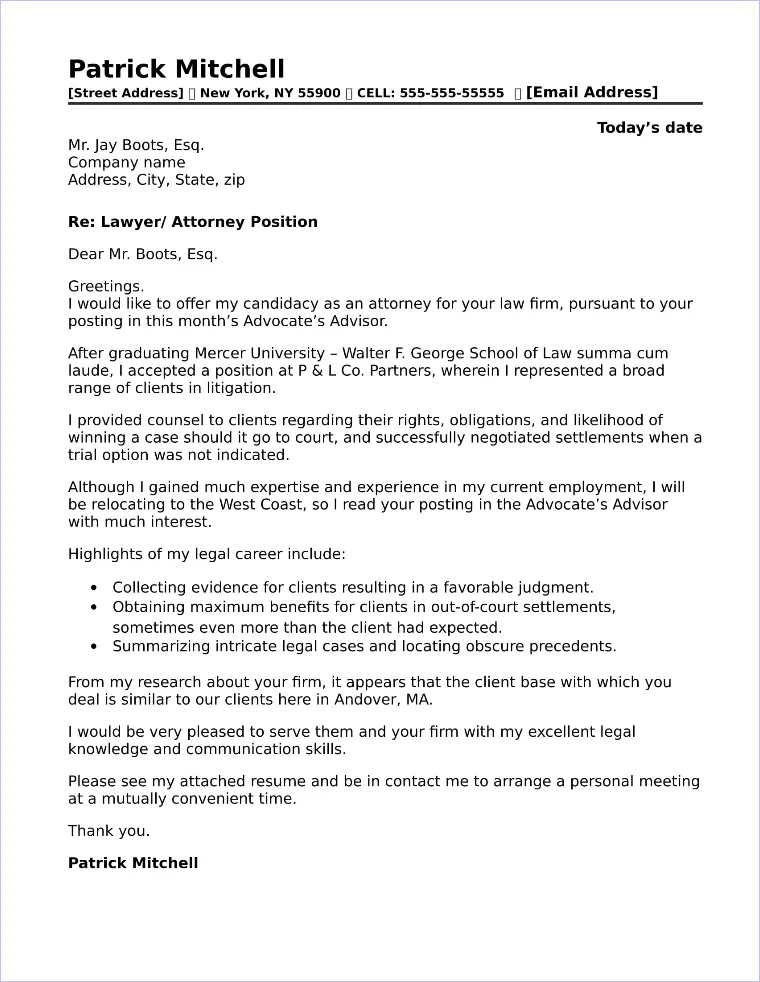
Font Selection and Readability
Choose a professional and easy-to-read font, such as Times New Roman, Arial, or Calibri. Maintain a consistent font size (typically 11 or 12 points) throughout the document. Ensure the font is clear and legible, as this is essential for making a positive first impression. Use clear formatting, including appropriate margins and spacing, to enhance readability. Avoid using overly decorative fonts that can distract from the content. Proper formatting demonstrates your attention to detail and professionalism, making your cover letter more appealing to the reader.
Proofreading Checklist
Proofreading is essential to ensure your cover letter is free of errors. Check for spelling, grammar, and punctuation errors. Review your letter for clarity, conciseness, and flow. Have a friend or colleague review your letter for a fresh perspective. Pay close attention to the names of the firm, the hiring manager, and the position you are applying for. Ensure your contact information is correct and up-to-date. A polished and error-free cover letter demonstrates your professionalism and attention to detail. Use grammar and spell-checking tools, but always read the document yourself to catch any errors the software may miss.
Common Cover Letter Mistakes
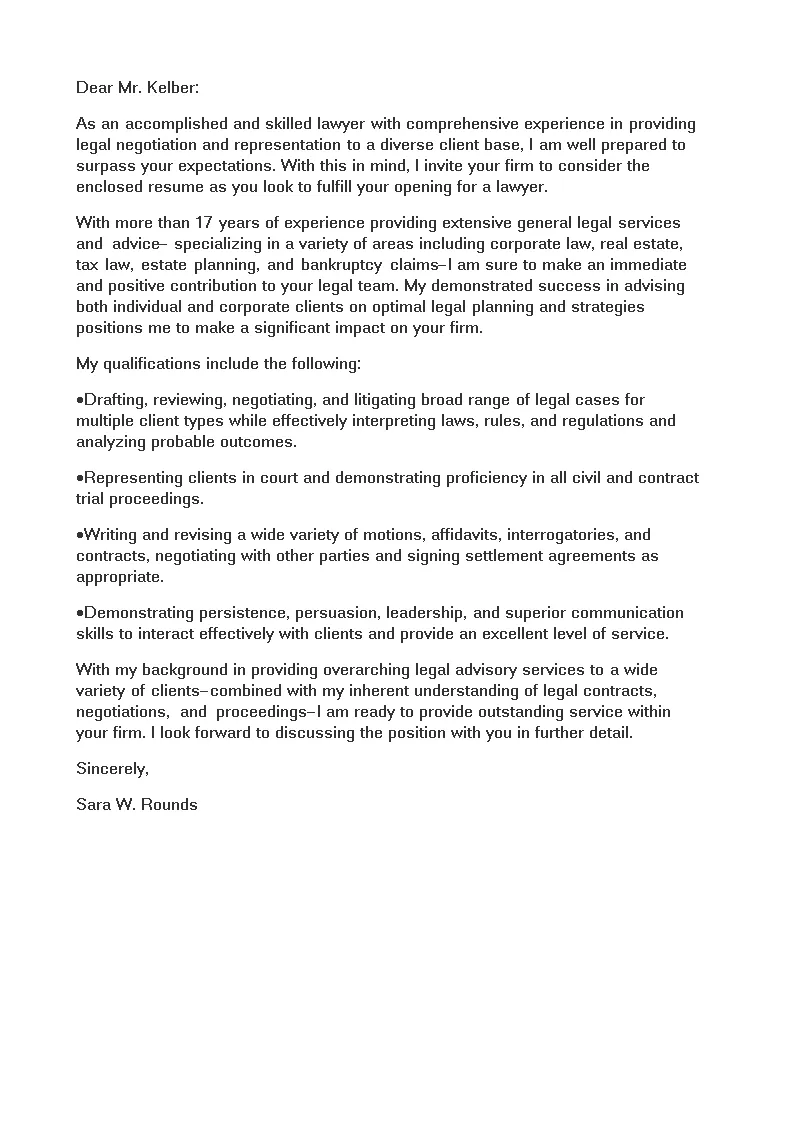
Generic vs. Personalized Cover Letters
One of the biggest mistakes is using a generic cover letter. Generic cover letters are easily identifiable and often lead to the immediate rejection of your application. They lack the personalization and specific details that demonstrate your genuine interest in the role and the firm. Tailor your cover letter to each specific job application by highlighting the skills and experience that align with the job description and the firm’s culture. Research the firm and personalize the letter to show you have taken the time to understand their needs and requirements. Take the time to customize each letter to increase your chances of standing out.
Typos and Grammatical Errors
Typos and grammatical errors are a major red flag. They can create the impression that you are careless or inattentive to detail. Always proofread your cover letter carefully before submitting it. Use spell-check and grammar-check tools, but don’t rely on them entirely. Have a friend or colleague review your letter for a fresh perspective. A well-written and error-free cover letter demonstrates your professionalism and attention to detail. Pay close attention to the details and the impact your writing has on the hiring manager. Proofread the entire document multiple times, as well.
Examples of Strong Lawyer Cover Letters
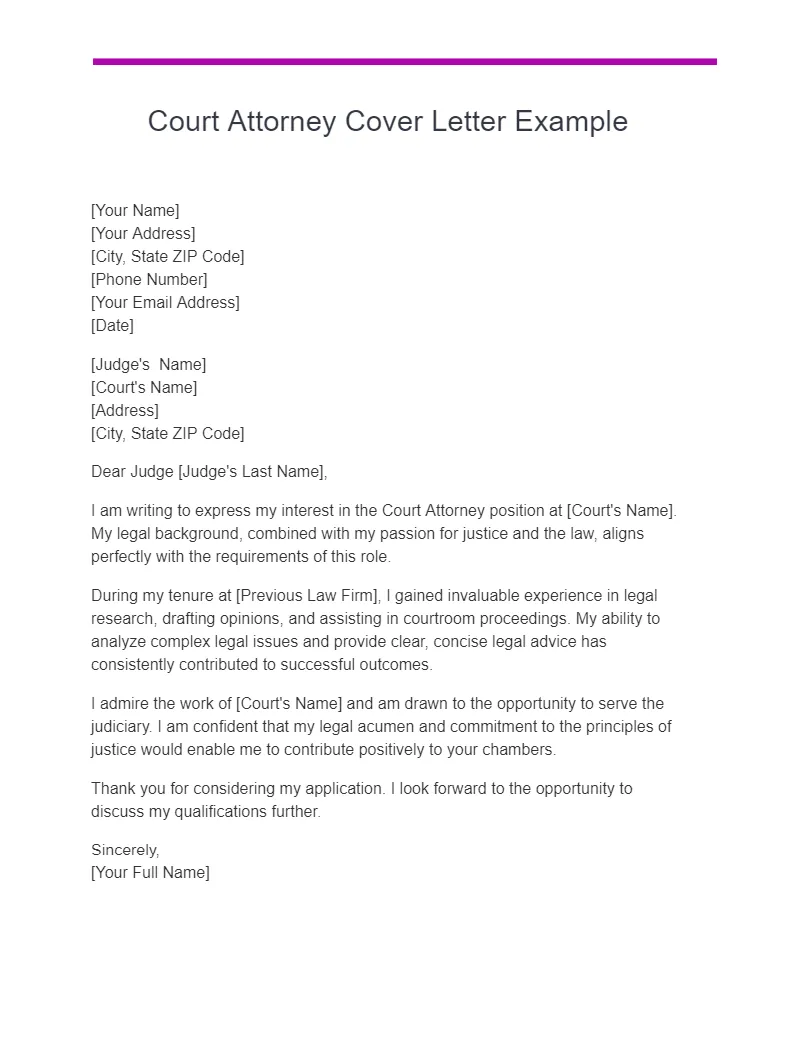
Example 1: Litigation Lawyer
A strong cover letter for a litigation lawyer would highlight the candidate’s experience in courtroom advocacy, legal research, and client communication. The letter should showcase successful case outcomes, experience in specific areas of litigation, and the ability to manage a high-volume caseload. It should detail the candidate’s ability to analyze legal issues, prepare effective pleadings, and negotiate settlements. The letter should also demonstrate a deep understanding of legal procedures and the rules of evidence. The applicant should highlight the skills and qualities that show why they are perfect for the job. This should include the candidate’s skills for client communication, and all aspects of courtroom advocacy.
Example 2: Corporate Lawyer
A cover letter for a corporate lawyer should focus on the candidate’s experience in transactions, contract drafting, and regulatory compliance. The letter should detail experience with mergers and acquisitions, corporate governance, and other relevant areas. Highlight any experience with international transactions, industry-specific expertise, or successful negotiations. The letter should also showcase your knowledge of corporate law, financial markets, and the ability to work with business clients. This will provide a clear view of their capacity to work with business clients and their knowledge of corporate law. Highlight any experience related to M&A, corporate governance, or relevant aspects of the field.
Example 3: Real Estate Lawyer
A cover letter for a real estate lawyer should highlight experience in property transactions, title insurance, and real estate litigation. The letter should emphasize experience with commercial or residential real estate, development projects, and lease agreements. Show knowledge of zoning laws, property taxes, and environmental regulations. Highlight successes in closing deals, resolving disputes, and representing clients. Include any certifications, relevant knowledge of commercial real estate law, and skills needed for your desired field. Be sure to show that you have extensive knowledge of your clients and show you’re passionate about their real estate deals.
Final Thoughts
Writing a compelling cover letter is crucial for lawyers seeking new job opportunities. It’s your chance to introduce yourself, showcase your skills, and demonstrate your interest in the position and the firm. Take the time to tailor each cover letter, highlighting your accomplishments, and proofreading carefully. By following these secrets, you can increase your chances of securing an interview and landing your dream job. Remember, the perfect lawyer cover letter reflects your unique skills and accomplishments, and shows why you are the perfect fit for a particular position. A well-crafted cover letter is an investment in your future.
